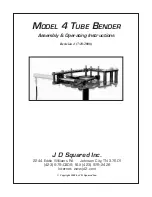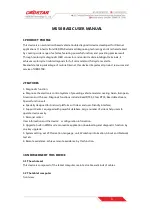
vii
Safety
Precautions when Using with Other Equipment
Precautions when Using with Other Equipment
Pacemaker
Minute ventilation rate-adaptive implantable pacemakers can occasionally interact with certain cardiac
monitoring and diagnostic equipment, causing the pacemakers to pace at their maximum programmed rate. The
cardiac monitoring and diagnostic equipment may possibly send wrong information. If such event occurs,
please disconnect the cardiac monitoring and diagnostic equipment, or follow the procedures described in the
operation manual of the pacemaker. For more details, contact FUKUDA DENSHI personnel, your institution's
professionals, or your pacemaker distributors.
Rate meters may continue to count the pacemaker rate during occurrences of cardiac arrest or some
arrhythmias. Do not rely entirely upon rate meter alarms. Keep pacemaker patients under close surveillance.
Reference
"Minute Ventilation Rate-Adaptive Pacemakers"
FDA alerts health professionals that minute ventilation rate-adaptive implantable pacemakers can
occasionally interact with certain cardiac monitoring and diagnostic equipment, causing pacemakers to pace
at their maximum programmed rate.
[Based on a safety bulletin issued by FDA Center for Devices and Radiological Health on October 14, 1998]
Non-Explosion Proof
Never operate the equipment in the presence of flammable anesthetics, high concentration of oxygen, or inside
hyperbaric chamber. Also, do not operate the equipment in an environment in which there is a risk of explosion.
Explosion or fire may result.
Defibrillator
When defibrillating, keep away from the electrodes or medicament applied to the patient chest. If this is not
possible, remove the electrodes or medicament before defibrillating.
If the defibrillator paddles are directly in contact with the electrodes or medicament, an electrical shock may
result by the discharged energy.
When defibrillating, make sure that the electrodes, sensor cables, or relay cables are firmly connected to the
device.
Contacting the metal part of the disconnected cable may result in electrical shock from the discharged energy.
When defibrillating, do not touch the patient and the metal part of the device or cables.
Electric shock may result from the discharged energy.
This equipment will return to standard operating mode within 10 seconds after defibrillating. However, when
in diagnosis mode, it may require 10 seconds or more after defibrillation to display the normal ECG waveform
as the time constant setting is large.
The stored data will not be affected. The measurement accuracy will temporarily decrease during defibrillation,
but it will not compromise the safety of patient and the equipment.
The QRS synchronized signal is not intended to be used as synchronized signal for defibrillator.
WARNING
DANGER
WARNING
Summary of Contents for Dynascope 8000 Series
Page 1: ......
Page 2: ......
Page 8: ...Contents ...
Page 14: ...Contents ...
Page 16: ...ii Safety About the Safety Precautions DSA 81 AC Unit HR 800 Recorder Unit ...
Page 40: ...1 2 Chapter 1 Installation of the Unit Contents ...
Page 52: ...2 2 Chapter 2 Network System Construction Contents ...
Page 62: ...3 2 Chapter 3 Using the External Media Contents ...
Page 68: ...3 6 Chapter 3 Using the External Media Formatting the Full Disclosure Waveform Card ...
Page 70: ...4 2 Chapter 4 Connection to the External Devices Contents ...
Page 86: ...5 2 Chapter 5 Initial Settings Contents ...
Page 112: ...6 2 Chapter 6 Setup Item Default Value Contents ...
Page 128: ...7 2 Chapter 7 Replacement Parts Contents ...
Page 132: ...8 2 Chapter 8 Cleaning Disinfecting Storing Contents ...
Page 138: ...8 6 Chapter 8 Cleaning Disinfecting Storing Cleaning the Equipment and Sensors ...
Page 140: ...9 2 Chapter 9 Maintenance Check Contents ...
Page 153: ......
Page 154: ......
















































